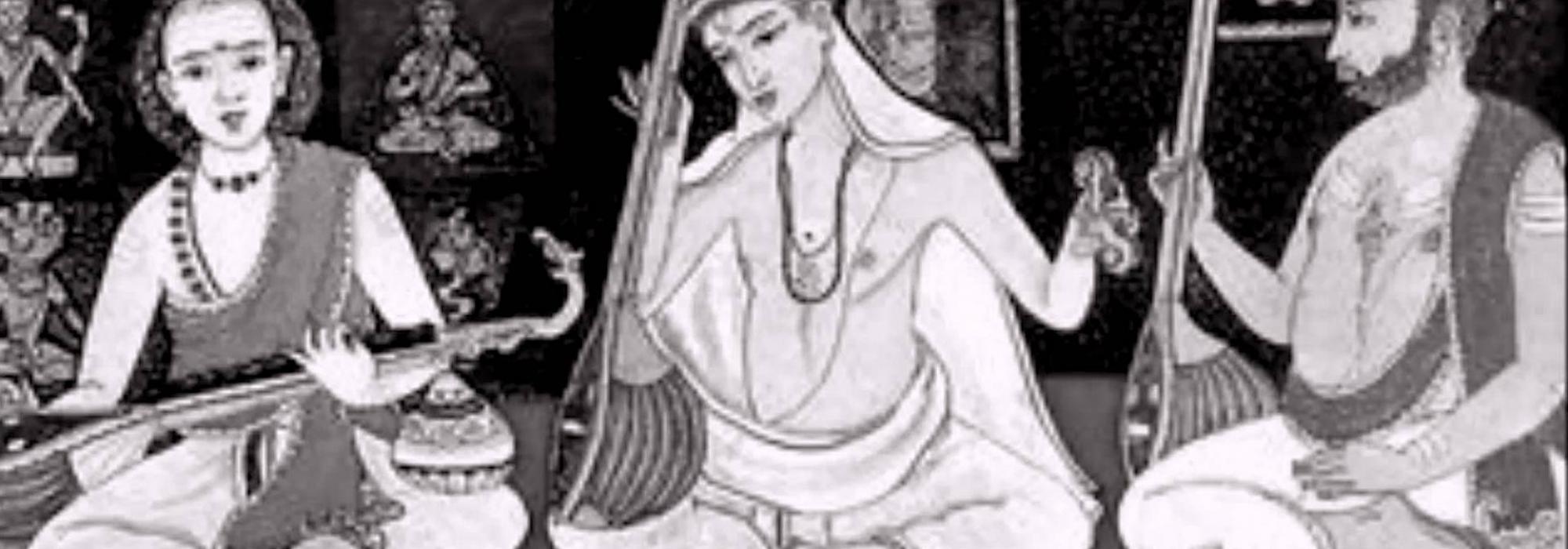Love of Scholarship
On another occasion I was walking on the Shankara Matha street from the south of Shankarapuram. An assembly had gathered in the front verandah of the Shankara Matha. It was around 10 or 11 in the morning. Both Chappalli Visweshwara Sastri and Motaganahalli Shankara Sastri were present. I joined the gathering. Sri Chappalli Visweshwara Sastri said:
“Look at him. He’s apparently born blind. He appears like a great Sanskrit Vidwan. That fellow is travelling across the country. His objective: to spread the message that the name “Hindu” is not appropriate for the Aryan People. His attempt is to erase this “Hindu” moniker. According to him, the word “Hindu” is derived from the root, “Hims” (meaning “to hurt/injure”); however, our primary Dharma is non-violence (Ahimsa); therefore it is misleading to apply the name “Hindu” which is derived from the “Hims” root to such a noble people; therefore, it is unjust. This is the thought concocted by the Huns and the Christians. Hence, it seems that we all must rise in protest.”
I felt like staying back there after listening to this description given by Sri Chappalli Visweshwara Sastri. I listened to that luminary’s Sanskrit oratory. He was wearing a dirty jubba and tattered clothes. My astonishment back then was, “how did this great man earn this standard of scholarship?” He had an assistant to take care of his needs. How did he afford to manage this staff? But then there was no time for such questions. They had to visit another town the same night.
It was around 11. Sri Chappalli Visweshwara Sastri stood up, folded his hands and invited that eminence for lunch at his home. He accepted the hospitality. I don’t know where he went next.
* * *
Instances like the aforementioned one show the kind of person that Sri Chappalli Visweshwara Sastri was. In reality, the fact that was a truly eminent scholar is a gross understatement. It will be closer to the truth to state that he was generous, large-hearted, compassionate, humane, and was partial to purity in all respects.
Sri Visweshwara Sastri wasn’t arrogant. On the contrary, he was extremely humble. As Diwan V P Madhava Rao told him directly, Sri Sastri didn’t even know how to ask something from someone. I have narrated this incident in detail in the episode on V P Madhava Rao.
The Pristine Royal Highway
For some time, I had desired to read a text named Manimanjaribhedini. However, I couldn’t find it in any bookstore. On occasion, Sri Chappalli Visweshwara Sastri’s co-brother, Muttoor Narahari Sastri had come visiting. He hailed from Sidlaghatta and was a friend of my relative who hailed from the same town. Owing to these relationships, I was very familiar with Sri Narahari Sastri. I confided my desire with him. He promised to procure this book.
After a few months passed, I asked him when I would get the book when he visited Sri Visweshwara Sastri’s home again. He kept saying, “I’ll get it, I’ll get it.” This happened three or four times. Once I was sitting with Sri Chappalli Visweshwara Sastri when Sri Narahari Sastri came visiting yet again.
I was hasty. I asked Sri Narahari Sastri, “Where’s the book?” He said, “wait, it’s on its way.” We began discussing other topics. After forty-five minutes elapsed, Sri Narahari Sastri said he had to go elsewhere and left.
Then Sri Chappalli Visweshwara Sastri asked me.
V: “Which book do you want? You were asking him?”
Me: “I wanted to read Manimanjaribhedini. I had requested him.”
V: “What does that mean? What book is that?”
Me: “There’s a work named Manimanjari, a canonical work of the Madhvacharya School. It contains derogatory materials about Adi Shankara’s adherents. As a rebuttal, some Advaitin [followers of Adi Shankara’s School] has authored Manimanjaribhedini.”
V (in Telugu): “Should we read such a petty work? Why do we need it? You’ve already read some commentaries. We must read commentaries. Should we read despicable books?”
A Commentary
On yet another occasion, I got a handwritten manuscript of the Kamandaka Niti Shastra. I shared my happiness with Sri Sastri. He was elated. He said, “Read from it.” I read the first verse as follows:
Yasya prasAdAdubhavanam
shAshwatE pathi tishTati |
devasya jayati srImAn
daMDadhArO mahIpatih ||
Sri Sastri’s enthusiasm was inflamed by the style of this verse. “What a poem! Such dignified style! How appropriate!” he launched into profuse praise along these lines and began a detailed commentary on the word daMDadhArah.
“Evil is the major part of the world. The first duty of a king is to contain evil. It is only after containing evil that the protection of the good occurs. Punishment is needed to contain evil. It is not possible to keep evil people in check without effective punishment. The kingdom (read: country) itself will not exist if evil people aren’t stopped. Therefore, the first instrument that a country requires is punishment. Everything else is secondary. ‘bhayAdbhogAya kalpate’—prosperity arises from fear of punishment. When fear is instilled within evil people, the good people will be able to live well, enjoy prosperity, and the rest. Therefore, it is definitely fitting that the author of Niti Shastra has invoked punishment first.”
Gandhi had not risen to fame in the period during which Sri Chappalli Visweshwara Sastri made this commentary. People who interpreted the word Ahimsa—contained in Sastras like the Bhagavad Gita—to mean “anarchy” didn’t exist in that period. Indeed, the suspicion that the propagandists of anarchy would take birth in future didn’t arise in Sri Sastri’s mind.
The world of today wasn’t the world of Sri Chappalli Visweshwara Sastri.
Concluded














































